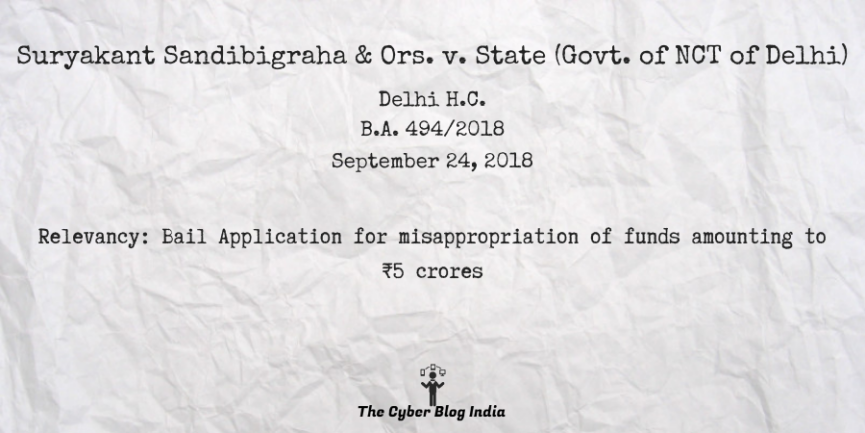Suryakant Sandibigraha & Ors. v. State (Govt. of NCT of Delhi)

Suryakant Sandibigraha & Ors. v. State (Govt. of NCT of Delhi)
In the High Court of Delhi
B.A. 494/2018
Before Justice Sanjeev Sachdeva
Decided on September 24, 2018
Relevancy of the case: Bail Application for misappropriation of funds amounting to ₹5 crores
Statutes and Provisions Involved
- The Information Technology Act, 2000 (Section 66C, 66D)
- The Indian Penal Code, 1860 (Section 34, 120B, 408, 419, 420, 447A, 467, 468, 471)
- The Code of Criminal Procedure, 1973 (Section 439)
Relevant Facts of the Case
- The complainant had a proprietorship firm for manufacturing and trading office furniture. Petitioner number 1, the accountant of petitioner number 2, was in charge of the said firm. The husband of the prosecutrix was running, controlling, and managing affairs of her business while running another proprietorship concern.
- It is alleged that the prosecutrix’s husband was diagnosed with a serious health problem because of which she became busy in his treatment. Petitioner number 1 was entrusted with all the accounting responsibilities thereafter.
- After the condition of her husband improved, he involved himself in the affairs of her firm as well as his firm. There were suspicious transactions in the accounts of both firms, inter-alia, in ticket bookings, online shopping, purchasing from unknown parties, online transfers to vendors, etc. When enquiries were made and account books of both the concerns were verified, it was found that approximately ₹5 crores were misappropriated.
- It is alleged that petitioner number 1 induced the prosecutrix to open bank accounts in the firm’s name in private banks and forged the signatures of the complainant and her husband to obtain authorization for online banking facilities. It is further alleged that the accused had dishonestly quoted his mobile number and e-mail ID, instead of the complainant’s mobile number and e-mail ID thereby transferring huge sums of money.
- The FIR further alleges that several properties had been purchased in the names of the accused and their family members.
Prominent Arguments by the Advocates
- The petitioner’s counsel submitted that the petitioners have been falsely implicated. All transactions were done by the petitioners, under the instructions of the complainant and her husband. The books of accounts were duly audited by chartered accountants and were signed by the complainant and her husband. The mobile numbers registered in the bank were of the firm and not the personal mobile number of petitioner number 1.
- The respondent’s counsel submitted that the husband went through treatment for five years and during the inquiry, it was established that all payments debited from the bank accounts of the complainant were done by the petitioner from the official e-mail IDs allotted to him. The forensic audit report of the reported fraudulent unauthorized payments amounted approximately to ₹5.25 crores.
Final Decision
- Bail application dismissed.
This case summary has been prepared by Ria Verma, an undergraduate student at Symbiosis Law School, Noida, during her internship with The Cyber Blog India in January/February 2021.
